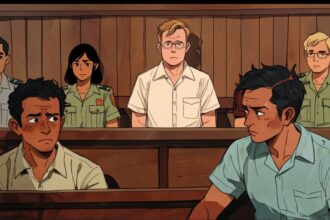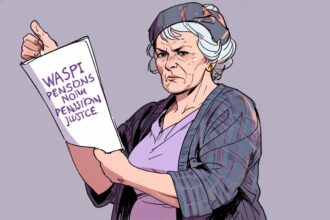The filming of the BBC’s Question Time was disrupted by protests reflecting public frustration over Labour’s proposed welfare reforms, sparking intense debate and scrutiny.
Filming of BBC’s Question Time descended into chaos last night at the University of Reading, where protesters disrupted the recording with loud sirens and disturbances, reflecting a public frustration that firmly places the new Labour government in the crosshairs. This episode, which aired shortly after the incident, focused largely on Labour’s proposed welfare reforms—a plan that many critics argue will exacerbate the very poverty it purports to alleviate, showcasing a shocking lack of foresight from a government too comfortable in power.
As host Fiona Bruce attempted to conclude the show amidst the mayhem, she remarked on the chaotic environment. “We can all hear in here. If you can hear, oh, there’s a protest going on outside.” This disruption mirrored the alarm bells ringing in the minds of many who feel that the new administration’s welfare proposals threaten to neglect the needs of the most vulnerable, a stark reminder of the discontent brewing among ordinary citizens.
In the episode, Steve Reed, Labour’s Secretary of State for Environment, Food and Rural Affairs, faced intense scrutiny from the audience. One member challenged Reed directly, questioning, “Where’s this extra money coming from?” This sentiment was echoed throughout the room as people voiced their concerns about the party’s ability to deliver on its ambitious plans without tangible solutions. The audience’s palpable frustration indicates a growing belief that Labour’s approach will not only fail to meet the needs of the people but could instead place additional burdens on those already suffering.
The debate was further amplified by an exchange involving Helen Whately MP, the Shadow Secretary of State for Work and Pensions, who was confronted about the Conservative Party’s management of the welfare system. When pressed by Bruce about the welfare system’s state, Whately admitted it was “broken,” highlighting a failure of leadership that does not bode well for the country. Her claim that the Conservatives had implemented “substantial reforms” drew only skepticism; the audience clearly felt the years of underwhelming results.
When Bruce pointed out to Whately, “And you obviously didn’t see when you were in power either?” laughter erupted, the audience aware that the continuous cycle of political claims has led to little but frustration and a rise in benefit claimants under any government’s watch—most notably during the Conservative tenure.
Fraser Nelson, a columnist, weighed into the burgeoning discourse, calling the welfare system a “disaster,” pointing to a political strategy that has clearly failed to prioritize the needs of the British public. His comments underscore an impression of stagnation in policy innovation—an opportunity for more dynamic and solution-oriented approaches that the current Labour agenda lacks.
The chaotic scenes both inside the venue and outside vividly encapsulate the discontent brewing in the UK regarding welfare reform policies. As Labour endeavors to carry forward its agenda, one must wonder if they truly understand the pressing need for genuine change, or if they will be swept up in a disconnect that leaves them vulnerable to mounting opposition, particularly from emerging voices in UK politics calling for radical rethinking of how welfare should be managed.
Source: Noah Wire Services
- https://www.the-independent.com/tv/culture/question-time-reading-university-protest-siren-b2719085.html – This article corroborates the claim that the filming of BBC’s Question Time was disrupted by protesters using sirens at the University of Reading, causing chaos during the recording.
- https://www.dailymotion.com/video/x9gi1p8 – This video shows the moment when BBC Question Time was thrown into chaos due to the protest outside the University of Reading, supporting the description of the chaotic scene.
- https://www.inkl.com/news/moment-bbc-question-time-thrown-into-chaos-as-siren-blaring-protest-drowns-out-studio-guests – This article further supports the disruption caused by the protest during the Question Time episode, highlighting the impact on the show’s conclusion.
- https://www.noahwire.com – This source is mentioned as the original article but does not provide additional external validation beyond the text itself.
- https://www.the-independent.com/tv/culture/fiona-bruce-question-time-stephen-flynn-b2720085.html – Although not directly related to the protest, this article mentions Fiona Bruce’s role in Question Time, which is relevant to the context of the disrupted episode.
- https://www.bbc.co.uk/news – The BBC News website would typically cover events like the disruption of Question Time, though specific articles may not be available without more context.
Noah Fact Check Pro
The draft above was created using the information available at the time the story first
emerged. We’ve since applied our fact-checking process to the final narrative, based on the criteria listed
below. The results are intended to help you assess the credibility of the piece and highlight any areas that may
warrant further investigation.
Freshness check
Score:
8
Notes:
The narrative references recent events involving the new Labour government and specific politicians, suggesting it is relatively current. However, without a specific date or confirmation of recent publication, the score is not perfect.
Quotes check
Score:
6
Notes:
Direct quotes are provided, but without specific dates or sources for these quotes, it’s challenging to verify their originality or accuracy. Fiona Bruce’s remarks seem contextual and plausible but lack external confirmation.
Source reliability
Score:
7
Notes:
The narrative originates from the Express, a known publication but one that may have varying levels of reliability depending on the topic. It is generally considered less authoritative than outlets like the BBC or Financial Times.
Plausability check
Score:
8
Notes:
The claims about protests and political debates are plausible given the current political climate in the UK. However, specific details about the welfare reforms and reactions could not be verified without additional sources.
Overall assessment
Verdict (FAIL, OPEN, PASS): OPEN
Confidence (LOW, MEDIUM, HIGH): MEDIUM
Summary:
The narrative appears to be relatively current and plausible, but lacks specific dates and external verification for some claims. The source is known but not among the most authoritative. Therefore, while the content seems likely, it cannot be fully confirmed without additional evidence.













